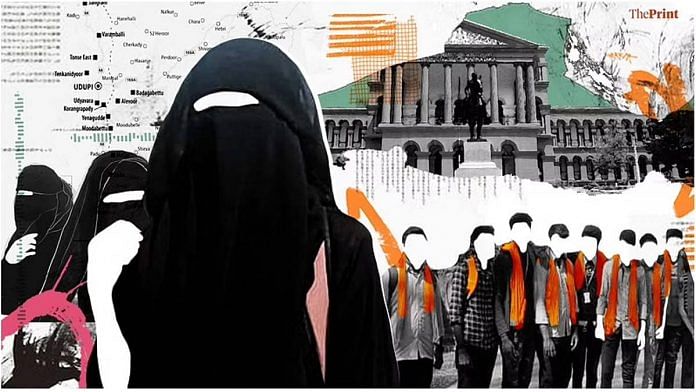Karnataka High Court’s verdict on the hijab row has raised a curtain of climax, at least temporarily. Yet, the social terrain underneath this institutional adjudication remains tenuous, waiting to implode. The controversy is symptomatic of a crisis of our times. It is not a political crisis as conventionally understood. What is this crisis then? It is the crisis of ideas, of incomprehension of ‘change’. To put it in a concrete way, it is the crisis of secular-progressive politics.
The questions that need to be raised are two-fold— how is Hindutva politics able to derive social consent towards politics of polarisation, and why are the oppositional forces unable to present an effective counter-narrative? A simple answer would be that while the left-progressive-secular groups have a moral critique of Hindutva, Hindutva has a socio-cultural critique of the Left. The gist of moral criticism is that Hindutva politics lacks empathy and tolerance towards difference. It is important to my mind to unpack all of these terms that are eternally constitutive of the Left’s ‘righteous Republic’. While the Left-secular groups are critical of the criminalisation of ‘Muslimness’ in the public sphere, liberals are extending this argument to say that the individual rights of Muslims are being violated by the State, which is increasingly a Hindutva majoritarian one.
History tells us that over and over that uncritical political reliance on superficial categories of ‘tolerance’ and ’empathy’ without resolving inherent contradictions is going to prove detrimental in the long run. German-American philosopher Herbert Marcuse makes a point about how liberal reliance on choice reinforces the logic of power, both social and culture, thus invisibilising repressive hierarchies. The narrative of choice weakens space for resistance by legitimising existing forms of social power. It is precisely this decadent alliance between the Left and liberals that has fructified Hindutva politics. It is interesting to see the Left harping on the rhetoric of choice to legitimise structures of subordination within the Muslim community.
Also read: Is hijab a choice? India can’t defend secularism on knife’s edge, like France
India’s post-colonial politics was premised upon articulation of social and cultural differences for representation. Articulating differences produced contingent social coalitions, falsely dubbed as ‘secular’, which in effect kept social groups separate and contradictions unresolved. The first major consequence of such politics is the Shah Bano and Ram Janmabhoomi cases. While social differences remained, it was papered over by a permanent bureaucracy, patronage State and power intermediaries that kept the system afloat. Old fault lines are being re-articulated with changing internal dynamics. Hindu society underwent two fundamental shifts in the postcolonial period—regulating Hindu personal codes and the Mandal revolution. The Muslim society rarely underwent either of these changes, at least none that could be traced. It is not surprising therefore that ‘politicisation of caste’ as Rajni Kothari called it, led to the decline of the Congress.
While fault lines within Hindu society have been more or less transformed, Muslim society remains under the impasse of strong traditional authority, rigid family obligations and a distanced cultural elite. Rather than formulating the plight of Muslim women solely as a symptom of the Hindutva onslaught, it needs to be formulated as a state of deprivation and social immobility that has kept the Muslim community educationally backwards. If the reason for Muslim girls not being able to attend schools without hijab is the social obligations enforced by the religious authority and the family, it is the moral responsibility to expand the scope of choice of Muslim girls and not to further embed them in traditional norms.
To my mind, that is the function of civil society. The task of political parties is to occupy this hitherto unnoticed space and re-articulate social, economic and political conditions of Muslim community to forge secular opposition. Opposition groups must speak about spatial segregation as an epidemic to the secular cause. They must speak of uplifting Muslim society from the repressive hold of the traditional maulvis whose diktats are often sacrosanct. To speak of Muslim women’s rights to attend schools or colleges without hijab is not to alienate Muslims but to open up spaces for dissolution of religious differences. Therefore, taking recourse to legal-constitutional methods of resolution is futile to my mind. So long as the Opposition relies on the logic of old order, it will remain dormant. It will fail to erode Hindu social consent for Muslim marginalisation. The task for it is to narrow inter-communal friction by integrating the discourse of secularism with gender justice across social groups. This will create a window for reinvention of the Opposition.
The author is a student of Vajiram and Ravi coaching institute, New Delhi. Views are personal.




